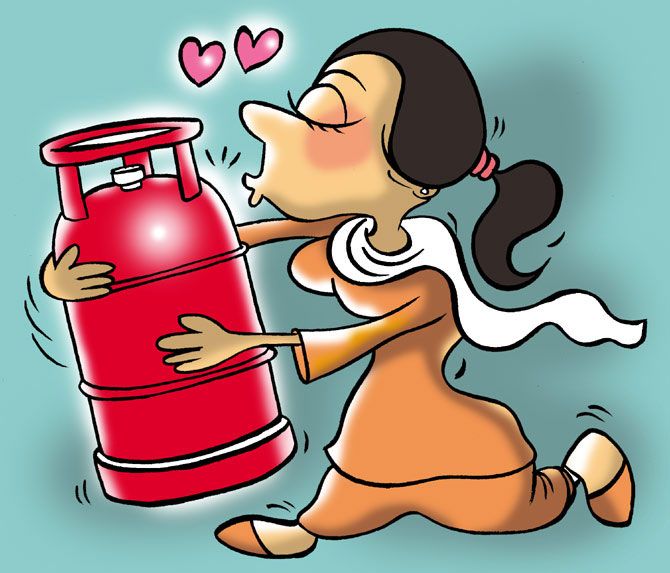#GiveItUp but no matching LPG connections for BPL

If you have given up your cooking gas subsidy, it might not mean it has lit the stove for a poor household. Despite Prime Minister Narendra Modi extolling consumers to give up cooking gas subsidy, through an impactful media campaign and #GiveItUp on microblogging site Twitter, there is no mechanism so far for providing a matching subsidy or connection to the poor.
It is only now that the petroleum ministry has started working on a national scheme to provide liquefied petroleum gas (LPG) connections to the poor.
There has, however, been a jump in the number of below-poverty-line (BPL) households being provided LPG connections as part of the corporate social responsibility (CSR) programme of the three state-owned oil marketing companies (OMCs). Around 1.6 million BPL connections had been added in the six months from January 1 to June 30, 2015, said a senior marketing executive with one of the companies.
"This has been possible primarily because of active support from the state governments and tighter monitoring by the petroleum ministry over the past few months," said another executive. Many state governments run schemes for providing LPG connections to BPL households.
Under the 'Give it up' policy hosted on a website for the programme, the petroleum ministry has only said: "The connection (BPL) shall be issued by the OMC to the eligible beneficiary to the extent of Rs 1,600 (security deposit of Rs 1,450 and pressure regulator of Rs 150 per connection) from the CSR fund scheme to the extent the apportioned CSR funds are available to six oil companies (ONGC, Indian Oil Corporation, Bharat Petroleum Corporation, Hindustan Petroleum Corporation, OIL and GAIL India)."
Around Rs 361 crore (Rs 3.61 billion) saved on the LPG subsidy (based on per cylinder under-recovery of Rs 167.18 for 12 refills a year for 1.8 million connections which have given up subsidy) are only savings for the government, which releases funds to the OMCs for making up losses incurred in selling LPG at below market price.
The GiveItUp campaign was launched by Modi on March 27 this year. "More than 280,000 people have given up their LPG subsidy, leading to savings of over Rs 100 crore (Rs 1 billion) in the past 10 months for the government," he had said in his speech at Urja Sangam, 2015, an international energy-focused summit organised by the petroleum ministry.
Under the scheme, the government is asking well-to-do citizens to voluntarily surrender their LPG subsidy through an outreach programme. Finance Minister Arun Jaitley, Attorney General Mukul Rohatgi and Power Minister Piyush Goyal were among the first to give up their subsidy.
A senior government official said they were mapping the LPG connections where the subsidy had been given up. He, however, admitted a matching correlation was currently not available, but added the giving up of the subsidy provided the government that much cushion to subsidise those not covered by LPG connections.
The new pan-Indian scheme still in the works will operate through state governments. The Centre is likely to match funds provided by states for promoting LPG use among the poor, said an official. This will also reduce the need for them to buy kerosene for cooking.
Of 7.3 million total new connections released by Indian Oil Corporation alone in 2014-15, less than 10 per cent (7.8 per cent), or 570,000, were for the BPL category. This was, however, much higher than the 455,000, or 5.6 per cent of the total connections added in 2013-14, and 255,000, or 3.7 per cent, in 2012-13.
The programme for providing LPG connections to BPL households is independent of the prime minister's campaign. Under the United Progressive Alliance (UPA) government's second term, IndianOil, BPCL and HPCL were asked to provide LPG connections to BPL families with a one-time financial assistance of Rs 1,400. This was equivalent to the security deposit for one LPG cylinder and one pressure regulator. Half of the expenditure on this was to be borne by the central government and the remaining from CSR funds of oil companies.
The plan was to cover 3.5 million families annually in 2010-11 and 2011-12, but the target remained elusive.
Another programme, the Rajiv Gandhi Gramin LPG Vitaran (RGGLV) scheme, was launched by the UPA government in 2009 to cover more households in rural areas. A senior OMC executive said the scheme was being recast to bring about a change in the policy guidelines for ensuring economic viability of the scheme in rural areas.
Illustration: Uttam Ghosh/Rediff.com












 © 2025
© 2025